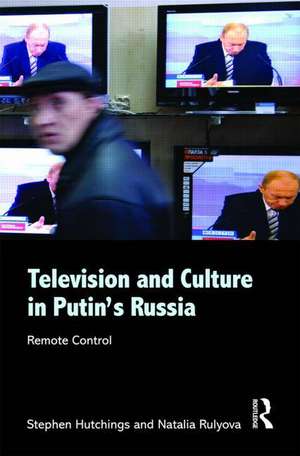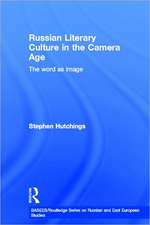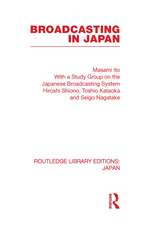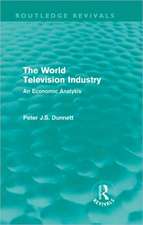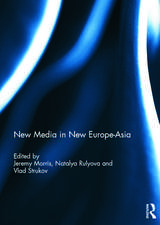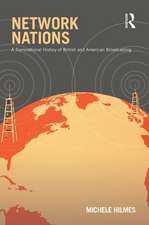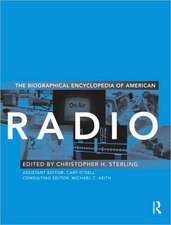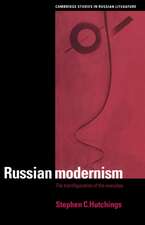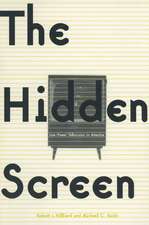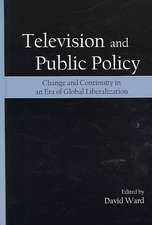Television and Culture in Putin's Russia: Remote control: BASEES/Routledge Series on Russian and East European Studies
Autor Stephen Hutchings, Natalia Rulyovaen Limba Engleză Hardback – 26 mar 2009
| Toate formatele și edițiile | Preț | Express |
|---|---|---|
| Paperback (1) | 200.46 lei 6-8 săpt. | |
| Taylor & Francis – iun 2010 | 200.46 lei 6-8 săpt. | |
| Hardback (1) | 398.18 lei 6-8 săpt. | |
| Taylor & Francis – 26 mar 2009 | 398.18 lei 6-8 săpt. |
Din seria BASEES/Routledge Series on Russian and East European Studies
-
 Preț: 228.19 lei
Preț: 228.19 lei -
 Preț: 311.22 lei
Preț: 311.22 lei - 8%
 Preț: 389.69 lei
Preț: 389.69 lei -
 Preț: 737.43 lei
Preț: 737.43 lei -
 Preț: 309.89 lei
Preț: 309.89 lei -
 Preț: 310.22 lei
Preț: 310.22 lei -
 Preț: 297.39 lei
Preț: 297.39 lei -
 Preț: 326.49 lei
Preț: 326.49 lei -
 Preț: 349.09 lei
Preț: 349.09 lei - 9%
 Preț: 1038.51 lei
Preț: 1038.51 lei - 24%
 Preț: 298.10 lei
Preț: 298.10 lei - 18%
 Preț: 1271.75 lei
Preț: 1271.75 lei - 18%
 Preț: 1057.05 lei
Preț: 1057.05 lei - 18%
 Preț: 1059.84 lei
Preț: 1059.84 lei - 18%
 Preț: 1062.26 lei
Preț: 1062.26 lei - 18%
 Preț: 1055.51 lei
Preț: 1055.51 lei - 18%
 Preț: 1057.75 lei
Preț: 1057.75 lei - 18%
 Preț: 1059.84 lei
Preț: 1059.84 lei - 25%
 Preț: 823.63 lei
Preț: 823.63 lei -
 Preț: 487.75 lei
Preț: 487.75 lei - 18%
 Preț: 1005.39 lei
Preț: 1005.39 lei - 18%
 Preț: 1000.76 lei
Preț: 1000.76 lei - 8%
 Preț: 382.79 lei
Preț: 382.79 lei - 18%
 Preț: 1059.84 lei
Preț: 1059.84 lei - 18%
 Preț: 1059.84 lei
Preț: 1059.84 lei - 18%
 Preț: 1009.21 lei
Preț: 1009.21 lei - 18%
 Preț: 1059.84 lei
Preț: 1059.84 lei - 18%
 Preț: 1167.36 lei
Preț: 1167.36 lei - 18%
 Preț: 1060.87 lei
Preț: 1060.87 lei - 30%
 Preț: 771.71 lei
Preț: 771.71 lei - 18%
 Preț: 1059.84 lei
Preț: 1059.84 lei - 18%
 Preț: 1004.20 lei
Preț: 1004.20 lei - 18%
 Preț: 1053.92 lei
Preț: 1053.92 lei - 25%
 Preț: 515.72 lei
Preț: 515.72 lei - 18%
 Preț: 709.01 lei
Preț: 709.01 lei - 25%
 Preț: 823.08 lei
Preț: 823.08 lei - 18%
 Preț: 1103.19 lei
Preț: 1103.19 lei - 18%
 Preț: 1057.75 lei
Preț: 1057.75 lei - 18%
 Preț: 1065.75 lei
Preț: 1065.75 lei - 18%
 Preț: 1055.51 lei
Preț: 1055.51 lei - 26%
 Preț: 850.73 lei
Preț: 850.73 lei - 25%
 Preț: 825.06 lei
Preț: 825.06 lei - 18%
 Preț: 734.50 lei
Preț: 734.50 lei - 26%
 Preț: 821.94 lei
Preț: 821.94 lei - 18%
 Preț: 1062.98 lei
Preț: 1062.98 lei - 18%
 Preț: 1002.63 lei
Preț: 1002.63 lei
Preț: 398.18 lei
Nou
Puncte Express: 597
Preț estimativ în valută:
76.19€ • 79.55$ • 63.06£
76.19€ • 79.55$ • 63.06£
Carte tipărită la comandă
Livrare economică 05-19 aprilie
Preluare comenzi: 021 569.72.76
Specificații
ISBN-13: 9780415419079
ISBN-10: 0415419077
Pagini: 272
Ilustrații: 7 tables
Dimensiuni: 156 x 234 x 16 mm
Greutate: 0.66 kg
Ediția:1
Editura: Taylor & Francis
Colecția Routledge
Seria BASEES/Routledge Series on Russian and East European Studies
Locul publicării:Oxford, United Kingdom
ISBN-10: 0415419077
Pagini: 272
Ilustrații: 7 tables
Dimensiuni: 156 x 234 x 16 mm
Greutate: 0.66 kg
Ediția:1
Editura: Taylor & Francis
Colecția Routledge
Seria BASEES/Routledge Series on Russian and East European Studies
Locul publicării:Oxford, United Kingdom
Public țintă
PostgraduateCuprins
Introduction. Chapter 1. ‘(Dis)informing Russia: Media Space and Discourse Conflict in Post-Soviet Russian Television News’. Chapter 2. ‘St Petersburg 300: Television and the Invention of a Post-Soviet Russian (Media) Tradition’. Chapter 3. ‘Russia's 9/11: Performativity and Discursive Instability in Television Coverage of the Beslan Atrocity’. Chapter 4. ‘Promiscuous Words: The Post-Soviet Tok-shou as Cultural Mediator and Hegemonic Pressure Point’. Chapter 5. ‘Unfulfilled Orders: Failed Hegemony in Russia’s (Pseudo) Military Drama Serials’. Chapter 6. ‘Laughter at the Threshold: My Fair Nanny, Television Sitcoms and the Post-Soviet Struggle Over Taste’. Chapter 7. ‘(Mis)appropriating the Western Game Show: Pole Chudes [The Field of Miracles] and the Double-edged Myth of the Narod’. Chapter 8. ‘Russian Regional Television: At the Crossroads of the Global, the National and the Local’. Chapter 9. ‘Television through the Lens of the Post-Soviet Viewer’. Conclusion. Bibliography.
Recenzii
'The most unconventional aspect of the book is that it addresses television not through the filter of the political, as is the case with analogous works, but from the standpoint of cultural studies and theories of cultural meaning. Hutchings and Rulyova also provide meticulous statistics on television programming in provincial cities as well as Moscow and St. Petersburg. Recommended.' - CHOICE, November 2009
Notă biografică
Stephen Hutchings is Chair in Russian Studies in the Department of Russian Studies, University of Manchester, UK. He is the author of Russian Literary Culture in the Camera Age: The World as Image (2004), and co-editor of Soviet and Post-Soviet Screen Adaptations of Literature: Screening the World (co-edited with Anat Vernistki, 2004), both published by Routledge.
Natalia Rulyova is Lecturer in Russian at the Centre for Russian and East European Studies, University of Birmingham, UK.
Natalia Rulyova is Lecturer in Russian at the Centre for Russian and East European Studies, University of Birmingham, UK.
Descriere
This book examines television culture in Russia under the Putin government. It demonstrates how broadcasters have been enlisted in a national identity project to install a latter-day version of imperial pride in Russian military achievements, over which Putin’s government exerts a form of remote control.
